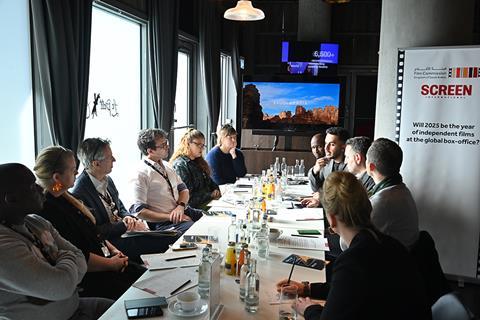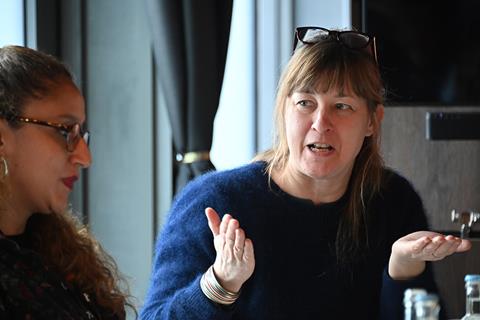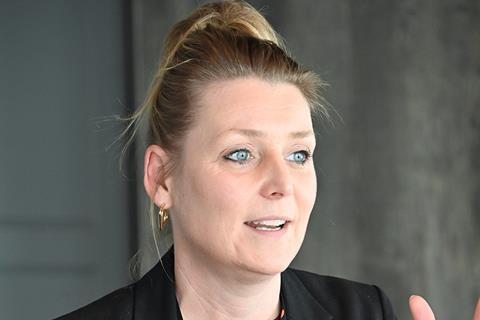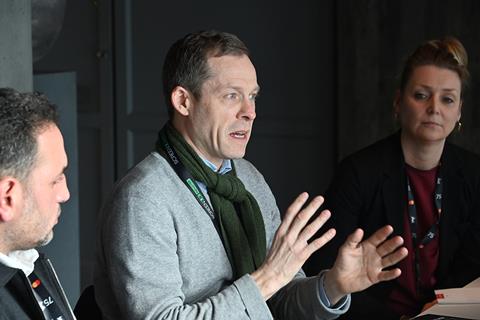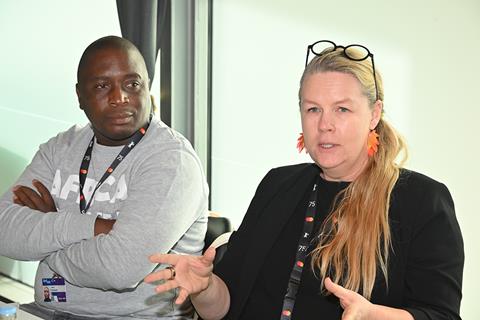Leading international film executives debated the outlook for independent films at the box office in 2025, at a Berlinale round table hosted by Saudi Film Commission and Screen International.
The session began with a presentation from cinema data analyst Gower Street, which predicts the 2025 global box office will make $32.7bn. This is up from 2024’s $30bn, but still below the $42.3bn reached in pre-pandemic 2019. Gower Street says it anticipates a strong summer (May-July) and Q4 this year. Among studio titles in the pipeline are Disney’s Avatar: Fire And Ash and The Fantastic Four: First Steps, Universal’s Wicked: For Good and Jurassic World Rebirth, Paramount’s Mission: Impossible — The Final Reckoning, and Warner Bros’ Superman.
Against this backdrop, the panel focused on the role independent films will play at the box office in 2025, coming off the back of a high-profile year for indie movies including Longlegs (which took more than $127m globally), The Substance, Conclave, Anora and The Brutalist.
Vive la France
France continues to be an outlier with a strong local industry compared to US studio fare. French films took a 44.4% market share last year, headed by A Little Something Extra and The Count Of Monte Cristo. By comparison, UK indie films accounted for a 6.9% market share.
Rakan Daghistani, national and international incentives director at Saudi Film Commission, pointed to encouraging signs at the local box office in 2025. He noted that Abdulaziz Alshlahei’s Hobal — which won the audience award at December’s Red Sea International Film Festival — had taken $5.5m at home since being released on January 2, exceeding US studio movies. Saudi films are also finding success internationally — particularly in Gulf Cooperation Council countries such as Kuwait, Qatar and the United Arab Emirates. Meanwhile, Saudi film critic and programmer Feras Almadi noted how far the Saudi industry had come since cinemas re-opened in the country in 2018, citing local successes such as thriller Mandoob (2023) and comedy Sattar (2022).
In Nigeria, local films took 46% of the theatrical market in 2024, according to Moses Babatope, group CEO of Nigeria’s Nile Media Entertainment Group. He said the international distribution of Nigerian films to the country’s diaspora is starting to bring in valuable revenue for the local independent sector, which has been disrupted by the pandemic and the growth of streaming among other economic challenges. There are other positive signs: “Even with increased ticket prices and a bad economy, people want to come to cinemas to have a good time.”
But beneath the headlines about strong box office for films such as The Substance, Flow and Robot Dreams, “it remains a huge challenge to release smaller movies because the main exhibition companies don’t want them”, said Ester Bernal, head of distribution at Mexico’s Piano. “We need diversity, but the small, very independent Mexican films are not working if you don’t release them with 300 copies — you’re not able to have good numbers. These smaller films don’t have the chance to go abroad — some of them are in festivals, but that’s it.”
Many of the speakers stressed the need for distributors and producers to be forward-looking, and not to rely on past ways of releasing films. “Some companies are just looking for survival, and others are thriving because they’re forward-thinking. They are trying to build direct consumer relationships and to get to know their audience,” said Ollie Fegan, CEO of the UK’s UsherU.
Sofie Hvitved, futurist and head of media at Copenhagen Institute for Futures Studies, said AI would empower more people to create content and lead to a boom in independent filmmaking. “We are looking into a huge explosion of experimentation in the storytelling field. We will see new formats, new ways to work with content, and new ways to rely on real-time data and how you get to know the audience better. A lot will leapfrog from the global south. There’s a huge potential there.”
But, she continued, this means distributors will have to adapt to a market flooded with more content. “I’m not sure it’s good for distributors working in a traditional way. But it can be good if you figure out how to understand these new ecosystems.”
Hvitved’s point was picked up by Jimmy Ranamane, general manager of global markets at Brand South Africa, who spoke of an appetite for African stories. But he questioned whether this would lead to growth in box office for local films; instead it is likely they will be seen on streamers. “That’s where most independent filmmakers are pushing towards, rather than cinema in a traditional sense.”
Gap in the market
Striking a positive note, Susan Iping, head of marketing at the Netherlands’ Kinepolis, said the disruptions of the US strikes had opened a window for independent films, and spoke of the importance of cinemas as a platform for promoting films.
Zak Brilliant, head of sales and distribution at the UK’s MetFilm Studio, said a healthy independent sector is good for audience choice and new filmmaking talent, but that it continues to work around the edges of the Hollywood system. “It absolutely has its place, but you’ve got to be realistic,” he said. “The tentpole movies keep the lights on for exhibitors. So they have to support those and double down on them. But over a 12-month period, there are opportunities around that. At certain times in a year, you have more chance with an independent film.”
Others focused on the need for indie filmmakers to think clearly about audience potential. “What I worry about in terms of the independent sector,” said Babatope, “is that there is sometimes a sense of entitlement, that ‘I’ve made a great piece and it should be seen,’ without working out what audience have you got for it.”
Meanwhile, Christine Eloy, managing director of Europa Distribution, spoke at length about the importance of independent directors, producers and distributors to have clear and honest conversations early in the process about the potential audience for a film. But this does not always guarantee success. She noted that many distributors will pre-buy based on a script. “The gap between what they read and what they get can be quite big.”
Added Hvitved: “In the world of hyper-personalised content that will come, you will need to understand what audiences want more.”
Many said the film industry still had much to learn from the tech sector. Fegan spoke of the importance for indie distributors to create first-party data and a direct relationship with their audiences. “One thing we always say is that making films is art, but selling films is ecommerce. And if you look at the ecommerce companies, they spend so much time trying to know their customer, what they like and where they go.”
The round table at the Hyatt Hotel was attended by Christine Eloy of Europa Distribution in Belgium; Ester Bernal of Piano in Mexico; Sofie Hvitved of Copenhagen Institute for Futures Studies in Denmark; Rakan Daghistani of Saudi Film Commission in Saudi Arabia; Ollie Fegan of the UK’s UsherU; Susan Iping of Kinepolis in the Netherlands; Jimmy Ranamane of Brand South Africa; Zak Brilliant at the UK’s Met Film Studio; Saudi film critic and programmer Feras Almadi; and Moses Babatope of Nigeria’s Nile Media Entertainment Group.























